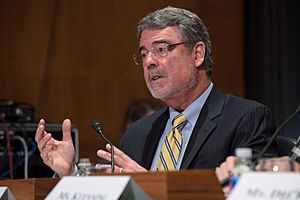Fitzhugh Mullan facts for kids
Fitzhugh Mullan (born July 22, 1942 – died November 29, 2019) was an American doctor, writer, teacher, and activist. He helped start many important groups like the National Coalition for Cancer Survivorship, Seed Global Health, and the Beyond Flexner Alliance. Mullan was a professor at the George Washington University. He taught about health policy and how to care for children. He was also a member of the National Academy of Medicine.
Early Life and Work
Fitzhugh Mullan came from a family of doctors. His father and grandfather were both physicians. He grew up in New York City and went to Harvard to study history. Later, he studied medicine at the University of Chicago.
Mullan started his activism during medical school in the 1960s. He worked in Mississippi to support civil rights with the Medical Committee for Human Rights. He was a leader in the Student Health Organization. He also helped organize the Lincoln Collective at Lincoln Hospital in New York. From 1971 to 1972, he led the Committee of Interns and Residents in New York City. He wrote about these experiences in his book, White Coat, Clenched Fist. This book tells the story of his early political education as a doctor.
In 1972, Mullan joined the United States Public Health Service. He worked as a doctor in a community clinic in New Mexico for three years. He was one of the first members of the National Health Service Corps. This program sends doctors to places that need more medical help. Later, he became the director of this program. He also served as the Secretary of Health and Environment for New Mexico. He worked for Surgeon General C. Everett Koop and led the Federal Bureau of Health Professions. He became an Assistant Surgeon General. In 1989, he wrote Plagues and Politics, a book about the history of the US Public Health Service.
Health Policy Work
In 1996, Mullan left the US Public Health Service. He started working as a writer and editor at Health Affairs, a journal about health policy. Health policy means the rules and plans for how healthcare works. He started a special section called “Narrative Matters.” He believed that personal stories could help people understand health issues better. Mullan wrote the first story himself, called “Me and the System.” He also put together a collection of these stories in a book called Narrative Matters in 2006.
While at Health Affairs, Mullan also started practicing pediatrics again. He worked at a health center in Washington, DC. He wrote about his experiences there in Health Affairs and The Washington Post.
In 2002, he published Big Doctoring. This book shared the stories of primary care doctors, nurse practitioners, and physician assistants. It showed the good parts and the challenges of their work.
Teaching and Research
In 2005, Mullan became a professor at the George Washington University. He taught about health policy and pediatrics. His research focused on the health workforce and health equity. Health equity means making sure everyone has a fair chance to be healthy.
From 2008 to 2010, he led a study for the Gates Foundation about medical schools in Africa. From 2010 to 2015, he directed a large US government project. This project invested $135 million in medical education in Africa. In 2010, he wrote a paper called The Social Mission of Medical Education. This paper looked at how medical schools help their communities.
In 2015, he started the Beyond Flexner Alliance. This group works to promote social mission in healthcare education. Social mission means that healthcare programs should focus on helping society and addressing health needs. He also helped Vanessa Kerry create Seed Global Health. He was the first Board Chair for this organization from 2011 to 2012. In 2015, he co-founded the George Washington Health Workforce Institute. In 2019, it was renamed the Fitzhugh Mullan Institute for Health Workforce Equity. This was to honor his work on health equity. He also started a program called Leaders for Health Equity Fellowship.
Cancer Survivorship
In 1975, Mullan was diagnosed with cancer. He wrote about his journey with surgeries, chemotherapy, and radiation in his book, Vital Signs: A Young Doctor's Struggle with Cancer, published in 1983. His book and an article called "Seasons of Survival" helped start the cancer survivorship movement. This movement focuses on the lives of people after they have had cancer.
In 1986, Mullan and other cancer survivors formed the National Coalition for Cancer Survivorship. Mullan served as the president and then chair of the NCCS Board of Directors from 1986 to 1993.


